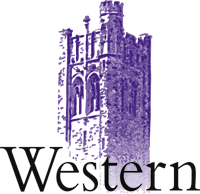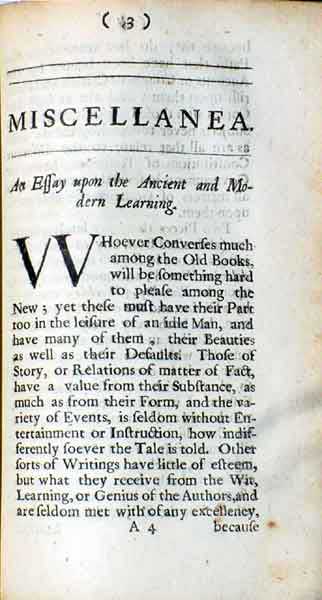
Jonathan Swift's "The Battle of the Books" (1704)
First published with A Tale of a Tub, Swift's "The Battle of the Books" (pub. 1704) is a deceptively simple mock-heroic account of a battle among the books reposing in the King's Library at St. James's Palace. The battle itself is a satirical allegory on an intellectual debate that had been raging in England since 1692, sometimes called the "Battle of the Ancients and the Moderns." In theory, this debate concerned the relative value of the intellectual accomplishments of antiquity, as compared to the "progress" that had been made in many fields of human knowledge since the Renaissance.
As was not unusual in seventeenth- and eighteenth-century Britain, the terms of this debate had already been anticipated by the French, who had been engaged in their own "Battle" for at least 30 years before it became an issue across the channel. The opening shot in England was fired, almost inadvertently, in 1692 by the publication of Sir William Temple's "An Essay upon the Ancient and Modern Learning," which appeared in the second volume of his collection of essays, Miscellanea. Sir William Temple had been a career diplomat, a rather old-fashioned "man of letters," and, not incidentally, Jonathan Swift's employer and chief patron; his essay was an elegant and wide-ranging but not very rigorous survey of antiquity and modern "progress" that concluded that the Moderns had, in fact, very little to add to the store of knowledge that had been inherited from the classical past.
 |
Unfortunately for Temple, part of his argument rested upon a laudatory discussion of two classical texts, the "Letters of Phalaris" and the Fables of "Æsop," that were, in actuality, forgeries of later antiquity, a fact that the classical philologist and Royal Librarian Richard Bentley was able to demonstrate conclusively in his Dissertation upon the Epistle of Phalaris (1698). Bentley, a classicist whose pioneering philological methodologies laid the foundation for many aspects of modern analytical criticism, epitomized everything that Temple and his supporters despised about the Moderns: he was a "professional" critic who had little tolerance for the older class-based mode of amateur scholarship, he was rigorous to the point of being pedantic, and he was, perhaps most importantly, "ungentlemanly"; in fact, part of the animus against Bentley was the result of an accusation by a well-connected young Oxford scholar, Charles Boyle, that Bentley had been rude and uncooperative in his capacity as Keeper of the King's Library at St. James's Palace when the former had approached him about viewing a manuscript in that collection. Bentley's own admittedly abrasive personality, his "common" class affiliations, and his lack of apparent respect for received values became, in themselves, important issues in the battle that ensued. |
Bentley was soon under attack by a great many proponents of the Ancients; most of these, significantly, chose to fight him through published satire, probably because Bentley's own knowledge was too formidable to enable them to defeat him employing more legitimately scholarly arguments. Bentley, for his part, received vital support from the formidable talents of another "Modern" scholar, William Wotton, a Cambridge don whose Reflections upon Ancient and Modern Learning (1694) effectively demolished many of Temple's arguments.
Jonathan Swift's contributions to the debate are most evident in his satirical "Battle of the Books," which recounts, in a pseudo-manuscript format that parodies the state of real ancient manuscripts, an actual epic battle between the volumes in Bentley's library at St. James's. Swift's own sympathies are unquestionably with the Ancients, and many a Modern author, including John Dryden, Abraham Cowley, and Aphra Behn, is bested by a classical combatant. At the climax of the battle, Bentley and Wotton themselves are vanquished by Boyle, imagined as an "auxillary" of the Ancients.
Swift's narrative is playful and light, and he takes the opportunity to settle many personal scores against near contemporaries like Dryden, but he also manages, along the way, to expose many of the more subtle dimensions and implications of the debate in which he is engaged. The Battle of the Ancients and Moderns was not, in fact, merely about whether the Ancients produced "better" authors and philosophers than the Moderns; it was more fundamentally about how "History" itself functioned and should be read, and about the relationships between past and present, humanity and nature, and human understanding and knowledge.
The plate illustrated here is one of 8 new plates (only one of which is accompanies the "Battle of the Books") included with the fifth edition of A Tale of a Tub (1710): it was designed, apparently, under the direction of the art critic Sir Andrew Fountaine and engraved by Bernard Lens and John Sturt, who ran a drawing-school at St. Paul's Churchyard. All are reproduced, along with the original designs by Fountaine, in Guthkelch and Nichol Smith's 1920 edition of A Tale. The engravings, it should be noted, are not especially apt representations of Swift's narrative, and there is no evidence that he had any hand in their design (although he was aware that they were being produced).
References and Further Reading
|
Levine, Joseph M. Humanism and History: Origins of Modern English |
|
[Includes a chapter on "Ancients, Moderns, and History.] |
|
DBW stack DA1.L47 1987
|
|
—. The Battle of the Books: History and Literature in the Augustan Age. Ithaca, N.Y.: |
|
[A very detailed and worthwhile account of the "War between the Ancients and Moderns," viewed from a number of perspectives.] |
|
DBW stack DA485.L48 1991
|
|
—. Between the Ancients and the Moderns: Baroque Culture in Restoration England. |
|
[A further examination of the subject that explores some hitherto overlooked aspects of the "Battle," including discussions of Evelyn, Dryden, and Sir Christopher Wren.] |
|
DBW stack PR438.A53L48 1999
|
 |
Website maintained by: Mark
McDayter
Website administrator: Mark McDayter
Last updated: August 27, 2002